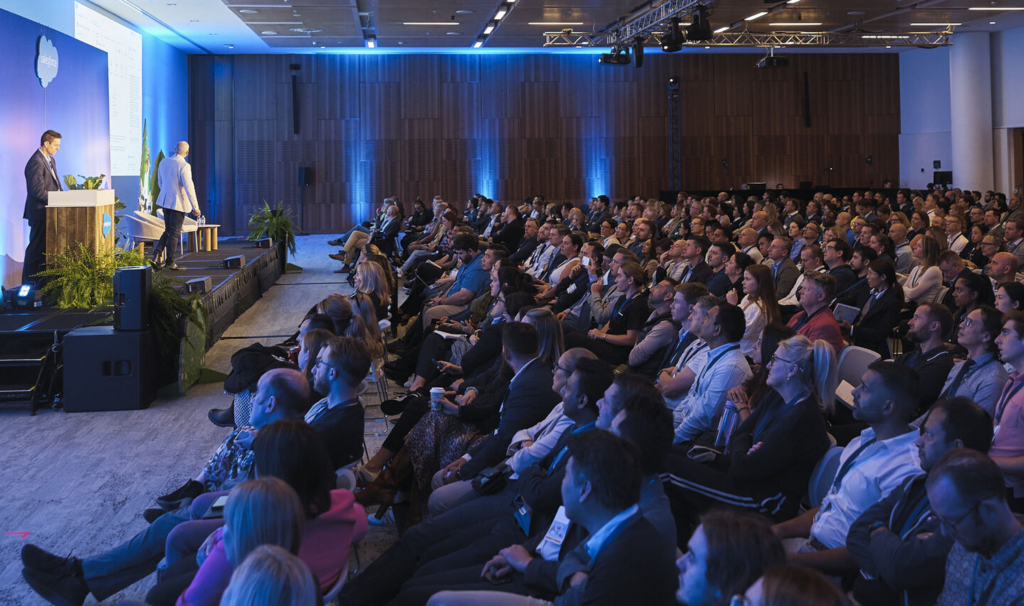David Janke is CPQ & Salesforce Consulting Leader, Senior Delivery Manager at Simplus and Salesforce Application Architect. He has worked on around 50 implementations across industries. David has recently been based in Melbourne, building the Simplus CPQ business in Australia and New Zealand. He explains how he became a CPQ expert by necessity, before he even knew the acronym – and why he finds the work so rewarding.
How did you start your CPQ journey?
I was originally on a finance and accounting path and years ago, working in a healthcare consulting firm, I stumbled on Salesforce as a reporting tool. We hired a developer to build a custom pricing module in Salesforce. It turns out what we’d built was a homegrown CPQ tool!
Fast forward a decade, and I ended up in a client-facing consulting role, and getting SteelBrick certified. They flew us out to San Francisco, and we got to learn from the master, Gilles Muys [then a Salesforce solution architect director and now Vice President of Customer Solutions at Simplus and QTC Evangelist]. He led a partner CPQ boot camp/training/certification and that was really exciting.
I did my first CPQ implementation at my prior company and worked in that new CPQ practice for a bit. But I wanted to expand my knowledge and focus on CPQ, and for that all roads lead to Simplus! I joined Simplus three years ago and everybody here – executives, managers, everybody and anybody – spoke CPQ. It was in the company’s DNA from day one. So that’s my journey: I was a CPQ manager before I even knew what the acronym meant, originally on the client side and now on the consulting side, and it’s taken me to the far reaches of the world!
What does it take to be a CPQ expert?
It takes about a week to learn the basics of CPQ – and a lifetime to master. I am still learning every day, with every implementation. It’s through tough implementations and wrong decisions that you learn the most. If a company is interviewing CPQ consultants, not only do they want to hear about your successful CPQ conversations, I would ask about mistakes and failures: Tell me about a CPQ implementation that you were on, that went terribly. What did you learn? What would you have done differently? As a client, that would actually give me more solace and comfort. Because I know if they made certain mistakes previously, they certainly wouldn’t make those with us.
How do you approach CPQ architecture with Simplus clients?
We look for areas of their business that do not fit in the out-of-the-box CPQ configuration. It is very flexible and we have many tools in the CPQ toolbox, but some clients need more. Not to fear, those can be accomplished with custom code, and extending the package. So we go in looking for hidden complexity in areas of the business, where we would have to extend the platform, above and beyond the out-of-the-box features.
What about planning for scalability?
We never just lift and shift a business’ current products and processes. We really focus on: how do you want to quote, what is the best way for your company to quote, and we architect for the future, because no client is static. You might have 10 products today, but you won’t have 10 products tomorrow, and we always plan with a rule of 10. If you have 10 products today, we will architect it to fit 100. If you’d have 10 employees today, let’s architect it to support 100. We always architect around scalability and flexibility, we plan for everything to increase by a factor of 10, if not more, always looking for products or pricing that might not fit in the out of the box CPQ, and how we will solve for that.
What other kinds of CPQ questions are you getting from clients?
Many clients – including the bigger ones – are asking us for advice about how other companies are doing it, of course. They want to hear tangible real-world examples of how other companies in their industry are quoting and how they are using CPQ. Acquisitions is a big one: you might have recently completed an acquisition or have one coming down the pipeline, and you have different tools, different products, different processes. The CPQ implementation is the perfect time to take all these separate systems and processes and combine them into one.
Where is Australia in the CPQ Lifecycle versus the US? What’s the opportunity?
In my opinion, there is not a vast disparity between the two countries in levels of CPQ awareness or potential. The same problems exist at the companies I’ve been speaking to in Australia as I see back home: executives and software decision-makers are aware of the CPQ tools in the market, and the need to embrace the CPQ platforms of the future. I think it boils down to the fact that there have not been many implementation experts here in Australia. It would be tough for a company to buy a tool without a supply of experts to install it. That’s a little bit of the chicken or the egg: Will companies invest in the tool first hoping there are enough implementation experts to help them, or will consulting firms invest in the skills first hoping there will be enough business for them? I think the use cases, the demand, the value for CPQ is equal here in Australia, and now we need to get more Salesforce technicians and developers CPQ certified – because the demand is certainly here.
To learn more about Salesforce CPQ please get in touch with one of our experienced team of consultants. Alternatively, if you are interested in becoming CPQ certified and want to join us, check out our Careers page to find out more about all of the exciting opportunities that we have available.






